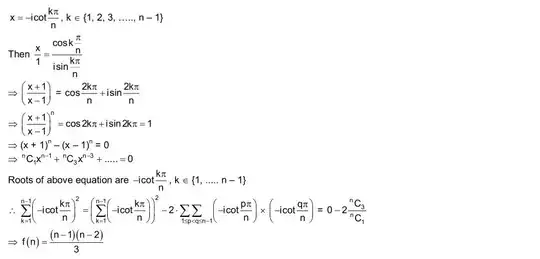It would be naïve and incorrect to proceed as follows
$$\begin{align}
\sum_{k=1}^{n-1}\frac{\cot^2(\pi k/n)}{n^2}&\underbrace{\approx}_{\text{WRONG!}} \frac1n\int_{1/n}^{1-1/n}\cot^2(\pi x)\,dx\\\\
&=\frac1n\left.\left(-x-\frac1\pi \cot(\pi x)\right)\right|_{1/n}^{1-1/n}\\\\
&=\frac2{n^2}-\frac1n +\frac2{n\pi}\cot(\pi/n)\\\\
&\to \frac2{\pi^2}
\end{align}$$
Instead, we use $\cot^2(x)=\csc^2(x)-1$ to write
$$\begin{align}
\sum_{k=1}^{n-1}\frac{\cot^2(\pi k/n)}{n^2}&=\frac1n-\frac1{n^2}+\sum_{k=1}^{n-1}\frac{1}{n^2\,\sin^2(\pi k/n)}\\\\
&=\frac1n-\frac1{n^2}+2\sum_{k=1}^{\lfloor n/2\rfloor-1}\frac{1}{n^2\,\sin^2(\pi k/n)}
\end{align}$$
Next, we note that for $\pi/2>x>0$, $\left(x-\frac16 x^3\right)^2\le \sin^2(x)\le x^2$. Hence, we have
$$\begin{align}
\frac2{\pi^2}\sum_{k=1}^{\lfloor n/2\rfloor-1}\frac1{k^2} \le \frac2{n^2}\sum_{k=1}^{\lfloor n/2\rfloor-1}\frac{1}{n^2\,\sin^2(\pi k/n)}&\le \frac2{\pi^2}\sum_{k=1}^{\lfloor n/2\rfloor-1}\frac1{k^2\left(1-\frac16\frac{\pi^2k^2}{n^2}\right)^2}\\&=\frac2{\pi^2}\sum_{k=1}^{\lfloor n/2\rfloor-1}\frac1{k^2}+O\left(\frac1n\right)
\end{align}$$
whence letting $n\to \infty$ and applying the squeeze theorem yields the coveted limit
$$\lim_{n\to\infty}\sum_{k=1}^{n-1}\frac{\cot^2(k\pi/n)}{n^2}=\frac13$$
